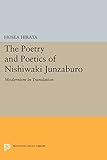The Poetry and Poetics of Nishiwaki Junzaburo : Modernism in Translation / Hosea Hirata.
Material type: TextSeries: Studies of the East Asian Institute ; 267Publisher: Princeton, NJ : Princeton University Press, [2014]Copyright date: ©1993Edition: Course BookDescription: 1 online resource (288 p.) : 2 line illusContent type:
TextSeries: Studies of the East Asian Institute ; 267Publisher: Princeton, NJ : Princeton University Press, [2014]Copyright date: ©1993Edition: Course BookDescription: 1 online resource (288 p.) : 2 line illusContent type: - 9780691604855
- 9781400863488
- 895.614
- PL834.I76 A24 1993
- online - DeGruyter
- Issued also in print.
| Item type | Current library | Call number | URL | Status | Notes | Barcode | |
|---|---|---|---|---|---|---|---|
 eBook
eBook
|
Biblioteca "Angelicum" Pont. Univ. S.Tommaso d'Aquino Nuvola online | online - DeGruyter (Browse shelf(Opens below)) | Online access | Not for loan (Accesso limitato) | Accesso per gli utenti autorizzati / Access for authorized users | (dgr)9781400863488 |
Browsing Biblioteca "Angelicum" Pont. Univ. S.Tommaso d'Aquino shelves, Shelving location: Nuvola online Close shelf browser (Hides shelf browser)

|

|

|

|

|

|

|
||
| online - DeGruyter Beyond the Unconscious : Essays of Henri F. Ellenberger in the History of Psychiatry / | online - DeGruyter The King of Inventors : A Life of Wilkie Collins / | online - DeGruyter Collecting: An Unruly Passion : Psychological Perspectives / | online - DeGruyter The Poetry and Poetics of Nishiwaki Junzaburo : Modernism in Translation / | online - DeGruyter Looking Backward : A Critical Appraisal of Communitarian Thought / | online - DeGruyter Italian Anarchism, 1864-1892 / | online - DeGruyter Sexual Symmetry : Love in the Ancient Novel and Related Genres / |
Frontmatter -- Contents -- Preface -- Introduction -- PART ONE. Translations -- PART TWO. Modernism in Translation -- Notes -- Bibliography -- Index -- Backmatter
restricted access online access with authorization star
http://purl.org/coar/access_right/c_16ec
This book offers an in-depth investigation into the writings of one of modern Japan's most gifted poet-scholars, Nishiwaki Junzaburo (1894-1982), who has been compared to T. S. Eliot, R. M. Rilke, and Paul Valéry. Exploring both his poetry and theoretical writings, Hosea Hirata describes how Nishiwaki, who wrote his first poems in English and French, shaped a highly influential poetic modernism in Japan while elevating the artistic status of translation. This volume includes Nishiwaki's highly original essays on the nature of poetry, his first two collections of Japanese poems, and a poem meditating on the annihilation of symbolism.The author maintains that in Japan the language of modernism was that of translation. When Nishiwaki finally began to write poems in Japanese, a new poetic language was born in his country: a translatory language. Hirata elaborates this birth of new poetry via translation by referring to the theories of translation and of différance articulated by Walter Benjamin and Jacques Derrida. The author reconsiders the view that translated texts are secondary to the originals, where the truth supposedly resides; instead he presents translation as an essential textual movement, écriture, toward the paradise of pure language and Poetry.Originally published in 1993.The Princeton Legacy Library uses the latest print-on-demand technology to again make available previously out-of-print books from the distinguished backlist of Princeton University Press. These editions preserve the original texts of these important books while presenting them in durable paperback and hardcover editions. The goal of the Princeton Legacy Library is to vastly increase access to the rich scholarly heritage found in the thousands of books published by Princeton University Press since its founding in 1905.
Issued also in print.
Mode of access: Internet via World Wide Web.
In English.
Description based on online resource; title from PDF title page (publisher's Web site, viewed 30. Aug 2021)


